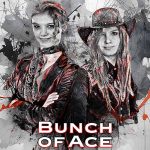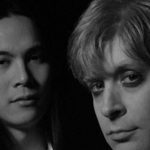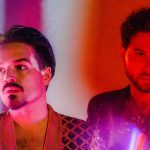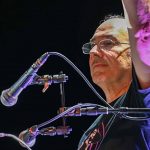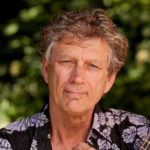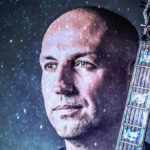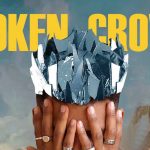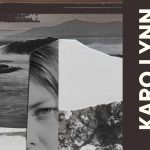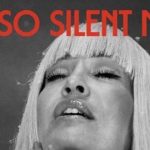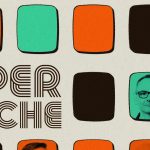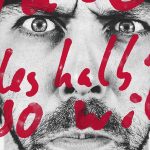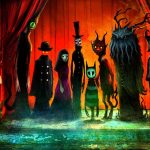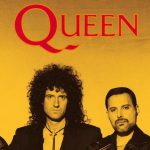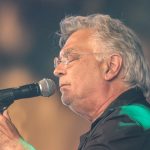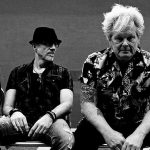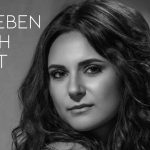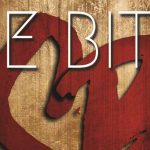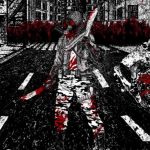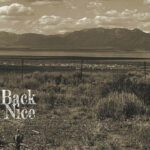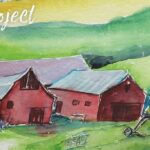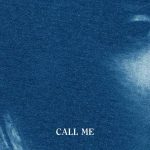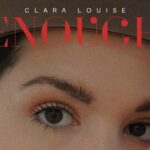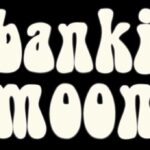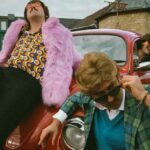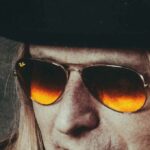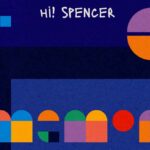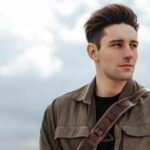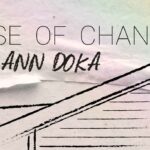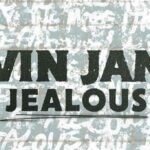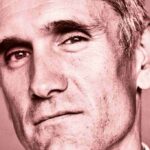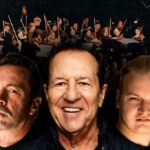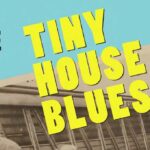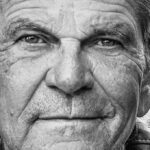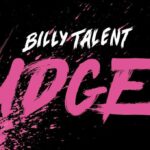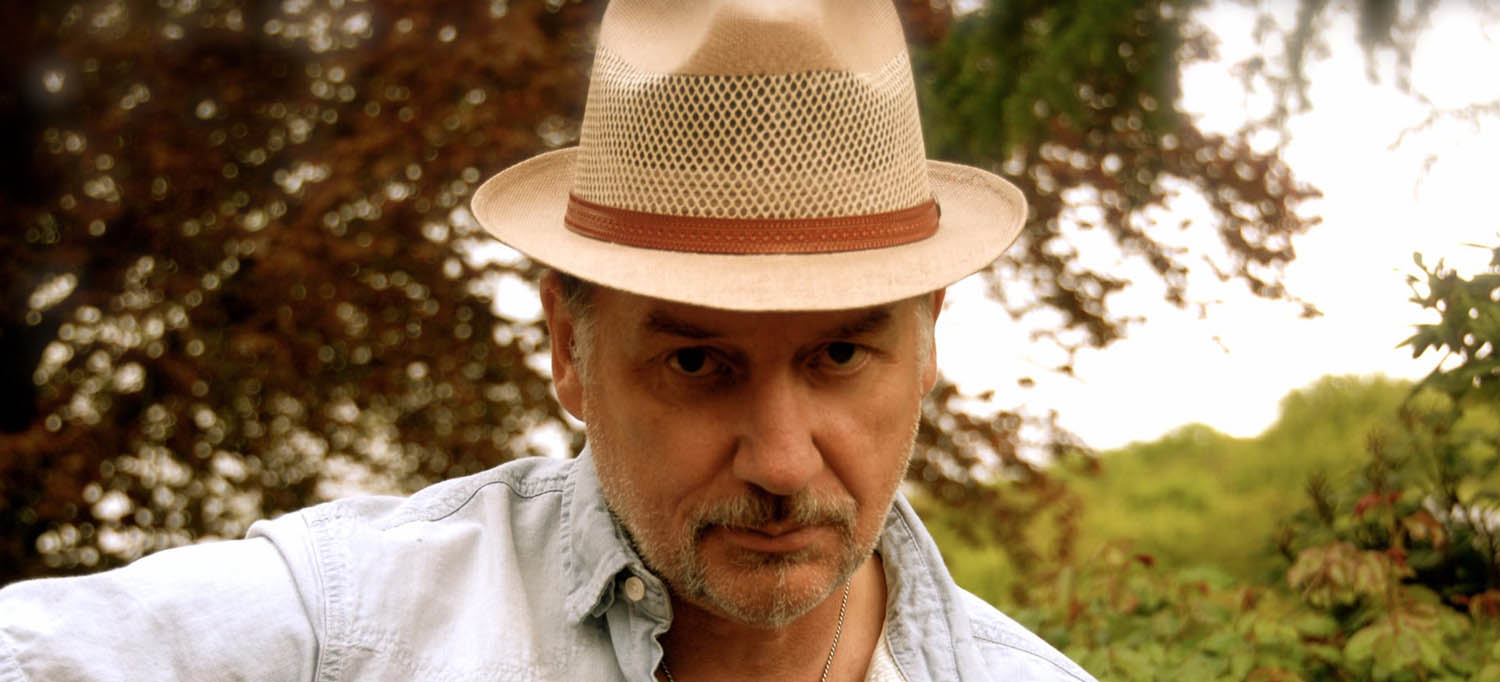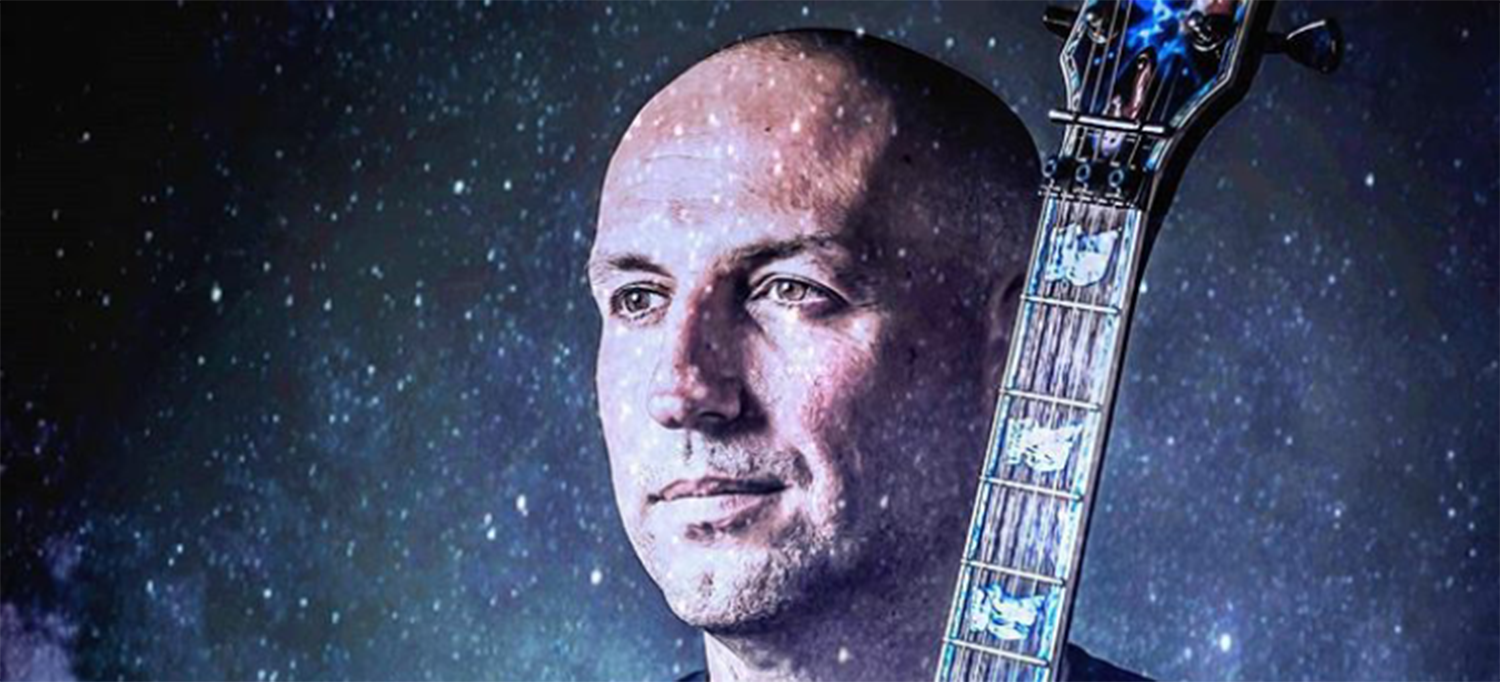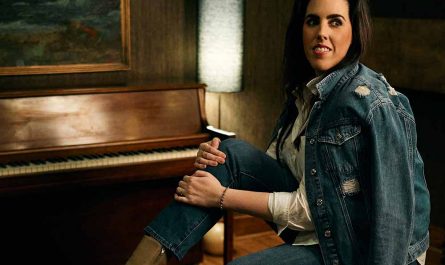Rickie Lee Kroell, the second time: I just introduced you to the pop artist and her new EP Hauptsache was mit Deichkind. I had the fortunate chance to have a deeper look behind the artist in the latest episode of my Flyctory.com Spotlight interviews. A really interesting one looking into various stages of her great career so far.
Flyctory.com meets Rickie Lee Kroell
FLYC: Rickie, thanks for joining us for an interview. I was really overwhelmed by all the different things you already did in your musical career. Let’s start at the very beginning: you were born in New York City, but rather early moved to Munich. What does the “Big Apple” mean to you?
Rickie: Thank you very much for having me! The “Big Apple” to me means an endless source of creativity with all the artists living there, but also a cruel vastness of possibilities. It’s my birthplace but I am still quite intimidated by this city, honestly. I admire people’s courage who decided to move there and make a living in NYC.
FLYC: Later, you studied music in Boston and Los Angeles, then moved back to Germany. What is the “most German” thing about you – and, of course, the “most US-American” one?
Rickie: The most „German“ thing I find in myself is my desire for properness when I’m in the States. The most “American” attribute is probably my enthusiastic and happy reactions to anything.

FLYC: Music has been part of your family. You father, Axel Kroell is a successful composer and producer. When did you start to feel that you want to pursue a musical career?
Rickie: My father has been my idol growing up (and he still is), and music has always been a crucial part of my family and life. But probably around the age of 16/17 I decided that music was the thing I really wanted to keep doing.
FLYC: Your father worked with big names of the business, like Wet Wet Wet, Such a Surge or also David Hasselhoff. Has there been one of these people who inspired you, apart from your father?
Rickie: Jazz musician and composer Karl Berger with Creative Music Studio; Verdine White, bassist of Earth, Wind & Fire, and of course Quincy Jones, whose production was with me since being introduced to Michael Jackson at a very young age.
FLYC: From rather early days, I found a concert report when you were 19, your music is heading towards jazz. Maybe not the most usual preference for a teenage artist. What does the genre mean to you?
Rickie: This project had been a mix between pop and jazz – listening to Jamie Cullum at the age of 14 was a segway into songwriting and Jazz for myself. Jazz to me is an evergrowing organism which stays open to its necessary change and development, and most importantly a place for pure musicality, expression, trust and connection.
FLYC: That concert was actually kind of interesting to me: in 2010 already, you recorded a 30 minute show which people could watch on different websites every day. How did you come to that idea?
Rickie: Yes! Back then there was a British artist who had “toured the internet” (I cannot remember her name!!!), my guitarist back then introduced us to the idea. From then on, we hopped from website to website and streamed these concerts many times. Our biggest “venue” of that tour back then was Rolling Stone.
FLYC: Did it somehow prepare you for the today’s restriction because of Covid-19, by the way?
Rickie: Yes, in some way, had we chosen to do concerts during this time. Live-Streaming has become a very important part in today’s live music during the pandemic, and I’m weirdly proud to say we already did that over 10 years ago.
FLYC: During the following years, you grew your career and had some nice success with some of your compositions. The most remarkable is likely the nomination for the Best Original Song – Documentary at the Hollywood Music Awards in 2018. Could you tell us a bit more about the nominated Song for the Unitled and how you wrote it?
Rickie: Thank you! Yes, the HMMA nomination was certainly great. Song for the Untitled is the credit song of an incredible but haunting Spanish documentary by Yeray Lopez Portillo about the horrible abuse of the Galgo – a dog breed used for the hunting season in Spain, which gets “disposed” of after they have served their duty or aren’t physically fit for hunting. The film’s composer and good friend Arturo Cardelús brought me on board for this song. I felt this song needed to be somewhat of a lullaby for the animal that has been saved from those cruelties,
and that it can feel safe now to sleep and see another day. It took me a couple days to write the words, and once Arturo’s strings got recorded and my vocals were in the bag, I felt the song’s full weight; I’m grateful it got nominated.
FLYC: The award was finally given to Dianne Warren. Other nominated writers in that category were big names like Tim McGraw, Lori McKenna, Quincy Jones or Patti Smith. How did that feel when you are named on the same level like them?
Rickie: Once I saw the announcement, I almost fell off my chair. I could have never dreamed of seeing my name next to these iconic songwriters and musicians! Diane Warren’s song for RGB was rightfully the winner, although the other nominees had wonderful songs as well…it’s so hard to make decisions on songs to win a contest!

FLYC: Since 2020, you started releasing singles, which now made it on your EP Hauptsache was mit Deichkind. Why is Deichkind a special band for you?
Rickie: Growing up, I’ve always been immersed by their work. Bon Voyage came out when I was ten years old, and from then on, I’ve been following their journey. They are special to me because they entirely embraced the change of times in music, adapted so well to the Zeitgeist and did all this while staying true to themselves and doing their thing. And they are so damn good at it. Especially their avant-gardist/weird/dada/perfect lyrics are the most important to me.
FLYC: Did the band know about your EP release beforehand? What has been their reaction?
Rickie: I don’t know if they have heard the songs yet. Maybe if one day they stumble upon it, their reaction will be positive and they’ll bob their heads and say: “I dig this.” And if not, that’s cool too. I just hope they can see how much I honor their lyrics and wanted to create an homage to their work.
FLYC: What made you choose songs like Hauptsache nichts mit Menschen for your release on 7th February 2022?
Rickie: I felt I could connect well with the lyrics of the songs I’ve chosen for this concept EP. This was actually originally only an experiment to see if I sounded good singing German by trying out singing their lyrics, after I’ve sung in English all my life. After the songs turned out this great though, I wanted the world to see them. The lyrics of those songs are the ones I connect with the most and felt most comfortable performing authentically.
FLYC: Is it, by the way, easier for you to write songs for yourself as an artist or for other performers? When do you know that a song might fit to you… or to somebody else?
Rickie: I feel it is easier to write for oneself because you know your own boundaries and what sounds good; but after a while you want to expand your experiences and abilities and challenge yourself to learn more about the others. In the best case you’ll make them look better than you could ever do yourself. Because they could sing the song I could only dream of being able to sing.
FLYC: The last single you released before the album has been Die Welt ist fertig. What is that song about?
Rickie: I believe it’s a critical look on human nature that keeps destroying life on planet Earth, with climate change happening, overpopulation, digitization… and in this song, humans have prepared for this. Like preparing for a store to close down and getting destroyed and accepting this, it will keep on existing in its demolition. Deichkind is excellent at critically describing a situation without sounding preachy.
FLYC: What are the next steps? Which are your plans for 2022?
Rickie: The next steps are bringing the music onto the stage and finally collaborating with authors to step away from covering existing songs. I would love to put more music to great written German words within such a collaboration.
FLYC: Moving away from music: you are truly a cosmopolitan artist and have projects in North America as well as Germany. What – and where – is “home” for you?
Rickie: Home is where my heart is – my partner and family are all in Germany, and after spending almost a decade in the States, I would prefer living in Europe. But there is nothing like working and travelling in the US – it’s driving, inspiring, humbling and incredibly fun. I’m still expanding my network in Germany after moving here and Covid hitting.
FLYC: How much did the Covid-19 travel restrictions harm your career?
Rickie: It was very hard to find solid ground. Everything was shut down for almost 2 years – production, possibilities to network, even just hope anything would turn back to normal – and there was nowhere to escape. Now it’s become a bit easier again, but there is definitely still a big heavy blanket on creative work-and-travel. I’ve lost 2 years of important groundwork after the big move back to Europe.
FLYC: What do you miss most about Germany, when you are in the US – and vice versa?
Rickie: When I‘m in the States, I miss the directness and honesty in people; and when I’m in Germany, I miss the lightness and fun of the Americans.
FLYC: Last, but not least: is there an artist you would love to write a song for?
Rickie: My big idol is James Blake – if I ever in my life get to collaborate with him, I could die happily.
Follow Rickie Lee Kroell Online



All pictures in this posting: Artist material (by Stickelbruck & Leis)
Spotlight Interviews – non-Country
Here are all my Spotlight interviews, which do not deal with country music:

Bunch of Ace is a Northern German teenage rock-pop duo. They have been featured in my Songs of the Week multiple times ...

Big names and emerging artists - I love to cover the full range of musicians in my Spotlight interviews. This ...

It late January 2025, I introduced you to the third EP by the German artist Luna Morgenstern, Heartbreak Hotel. Luna and ...

Over two million followers on YouTube, slightly less on TikTok and still about half a million on Instagram - Indonesia's ...

It is very hard to put the music by Israeli artist Dekel into a single genre. There is a touch ...

This April 2023 episode of my Spotlight interviews is one I have been a bit of nervous about, indeed. After ...

When I thought about the concept of Flyctory.com, I wanted to bring people together. I wanted to teach travelers about ...

They started in school years in Kassel, Germany and are now a global musical success. The song Stolen Dance catapulted the German ...

I am already flattered to head to the United States. I am going to Florida next week to see five ...

I am really glad to present you a new artist in my Spotlight interview section. Tomas Rimeika became quite famous ...

Upsahl is a pop-rock singer-songweiter from Phoenix, Arizona. Just before she is setting foot on German soil during her 2022 ...

Just this weekend, I introduced you to Fear & Dagger, the second album by the Swiss beatdown band Paleface. Even though ...

It's been quite a while since I released my previous Spotlight interview. The more, I feel flattered to dip into ...

Linda Mar (or Linda Marlen Runge, which is her civil name) is truly a multi-talent in performing: Likely, most people ...

Frances Luke Accord is a US-American folk music duo, which has been founded during their common time at high school ...

Riley Whittaker contacted me just some one or two weeks ago. She is a young artist from Sedona, Arizona, who ...

In the recent past, my Spotlight interview section hosted some very interesting young artists as well. For example, I chatted with ...

Just in time: one day before Jim "Kimo" West will release his new album More Guitar Stories, I had the opportunity ...

Lucy LaForge is the head and lead singer behind Lucy & La Mer. Based in Los Angeles, the singer / ...

I was really looking forward to have this chat with Rob Favotto, who is an Australian artist doing instrumental music ...

While my Spotlight Interview so far have been concentrated in the country music scene, I was very happy to run ...

Van De Forst is one of the most interesting German country music / country pop music act. Vanessa, the person ...
2022 Music Postings About German Artists
Here are all my Music & Media postings released in 2022 related to German Artists:

While the music market is more and more focusing on singles and even writes weird stories like Taylor Swift's "Top ...

Since I started working with Flyctory.com, I present you a list of my favorite songs at the end of every ...

Christmas weekend - Marry Christmas to everybody who is celebrating. I guess that this week and the following one will ...

I was quite surprised that finally 15 songs made it into my Songs of the Week as of 16th November 2022 ...

Now that Christmas is getting closer, it is also a great opportunity for less known artists to receive some additional ...

Music from Hamburg: King LX is a rather new collaboration from the Northern German city. On 16th December 2022, they ...

Just some ten days left until Christmas. Instead of my typical album preview, I this time go for a preview ...

I was quite amazed that there were quite a lot of interesting single releases this week. At least artists from ...

Basta by the German band Sündflut is one of these records, which I just had a short listen to and just ...

Nina Hagen is one of the most iconic entertainers in the German cultural scene. The German "Godmother of Punk" wrote ...

A lot of Christmas songs, a lot of covers and best of albums are the new releases in the - ...

The Christmas business is more and more turning towards TVs, toys and other stuff, while the music industry is doing ...

Almost four decades of music, 13 albums, more than 6,000 shows - even though Boppin' B are no chart-busters, they ...

"Little Christmas" - as there is Thanksgiving in the United States, the volume of new releases is significantly reduced, just ...

After quite a while as a band member, German David Gramberg decided to turn solo. On 25th November 2022, you ...

A Line in My Skin is a new album by the German artist Karo Lynn. I guess it has been the ...

Samuel Rösch became famous by winning the TV show The Voice of Germany. I already had a look into his music ...

After I loved his 2021 album One Can Wreck It All, I was really excited to see that there will be ...

Very interesting weekend this time: with the shows of Milky Chance and Brett Young, both in Cologne, I had quite ...

I love country music - but I always feel very gifted when I am able to present you some other ...

They started in school years in Kassel, Germany and are now a global musical success. The song Stolen Dance catapulted the German ...

There are so many Christmas music albums each and every year - I typically try to filter out interesting ones ...

The musical even of the week to me was definitely the announcement of the 2023 European Weird Al Yankovic tour ...

Especially if you frequently watch concerts in Germany and neighboring countries, you simply know Tina Tandler. You might not know ...

This is already the second time I met Nik Wallner for a Spotlight interview on Flyctory.com. While the first time we chatted ...

After two intercontinental trips in October 2022, I am somehow glad that I am scheduled to stay in Europe until ...

Jazz meets funk - the concept of the self-titled album by the band Superläuche (which is hard to translate, roughly ...

Right after coming back from New York City, I headed to the Helios37 in Cologne the same evening. Sound of ...

Just two months until Christmas - but I still refused to have an according song in my Songs of the Week ...

On their website the German band Hostage states. "There is only one rule: Stylistic boundaries do not exist." I received ...

Artists like Wally from Germany are musical encounters which make me enjoy creating contents for Flyctory.com. I ran into his ...

October is quite a busy time for me. Private and business trips take most of my time. My Songs of the ...

Avantasia is back... again and again and again... What started as a one album... or two album metal opera turned ...

Freddie! Who would have thought that Mr Mercury is part of my Songs Of The Week one day. Not sure if Bryan ...

While doing tour-chasing in Florida, I am very glad when I am able to prepare postings for Flyctory.com beforehand, especially ...

I had an amazing week in Cyprus and am just about to prepare for my second trip to the Weird ...

Classic music performed (more or less) a capella - I have been really amazed by the German project SLIXS when ...

I typically rather sort out new albums by the sound than by the popularity of the artists. Thus, I am ...

Melodic rock from Munich: Magical Heart are delivering right what you really need after spending a few days at the ...

The last three months of the year are about to start. Traditionally, the focus is rather on well-known artists, their ...

Even though there are quite a bunch of German (language) songs and German artists in the set of new releases ...

The band Kill Strings is called "Hamburg's Foo Fighters" - quite a lot of pressure on the German rock band ...

While the last week brought me to Sunderland, Hamburg and Lillehammer in Norway, the song selection of the week comes ...

Especially in the early 1990's, the German project U96 was very present in the European electronic music scene. Some thirty ...

Intense weeks lay ahead of me. My very last shows of my favorite musical Rock of Ages this year are ...

Power metal from Germany: Blind Guardian are a German band from the Rheinland region. They are active since 1984 and ...

The studio album Perspektiven is actually my second album review of a Roland Kaiser release. After the Christmas album Weihnachtszeit, Kaiser is back ...

Hallo, ich bin Jolina Carl - "Hello, I am Jolina Carl" rather sounds like a debut album than the release of ...

I typically just select the song, which is leading my Songs of the Week. This week, my favorites of the week ...

If you translate the band name Drei Meter Feldweg literally, you end up by "Three Meters of Country Lane". Sound ...

Honestly, I had a lot of 1970's and 1980's songs in mind the last days - so exclude me in ...

A talent show changed the life of a teenage German artist - and the result is this album. Luna Klee ...

Rock and harder rock styles have been a bit of under-represented in here the last weeks. The more I am ...

The third Vanessa Mai album review: after I really liked her 2020 release Für immer and absolutely struggled with the ...

Rather dark rock tunes from Munich: the Band Versus Goliath is releasing their album Liebe & Chaos on 12th August 2022 ...

Legendary Gipsy Kings and one of Germany's biggest potential drivers of country music, More Than Words - I felt really ...

After featring the German pop duo Havet in my Songs of the Week edition of 29th July 2022, I now ...

After I featured Marie Reim's debut album 14 Phasen in June 2020, I was really curious how her music has evolved during ...

German schlager icon Wolfgang Petry is back with a new EP. After a "real" Wolfgang Petry album release, Auf das Leben, ...

Weird times: my list of candidates for my Songs of the Week this time was much longer, but a lot of ...

Interesting indie-folk from a German artist: Wild At Heart is in fact the third EP by Broken Forest, who lived in Germany ...

Even though there are also some examples in the rock industry as well, boy bands are typically a pop music ...

LustfingeR is named to be one of the oldest punk / punk rock bands in Germany. The Southern German band ...

Typically, I first collect tracks for my Songs Of The Week and, once the set is complete, pick my favorite and ...

She Bites is a German band doing classic rock. After they had a well-reviewed debut album two years ago, they ...

Powerful party tunes which are made to be great on stage: five years after their first release, the Bavarian band ...

The list of songs as of 15th July 2022 is rather compact. I open with a very interesting British pop ...

Interestingly, most of the press information I received about Das Jahr, das sich um eins verschiebt by Philipp Eisenblätter declares the ...

Survive is the debut EP by a Berlin-based project, Confirmation. I got in touch with their music and felt to share ...

Also due to their rather well-known band members, More Than Words is one of the most promising country music acts ...

Everybody in Germany knows the songs Ich will Spaß ("I want to have fun", a song about having fun cruising in ...

Okay, this week, my Songs Of The Week listeners need to stay strong: I started my list with schlager (with a touch ...

An artist I did not know about anything before: Just two days before her debut EP Brown Eyes was about to be ...

The German magazine Rock Hard wrote about Traitor, that the band "is playing the most persuading new-old-school-thrash, which I have ...

This week, I had at least an easy time determining the leading track of my Songs of the Week. I listened ...

The album preview of the week this time is a bit of darker than the beautiful melodies of A Smell of ...

Whenever I start working for my Songs of the Week, I typically scan the candidates I archived for that reason and ...

The press kit to Brain Freeze, the second EP by Leepa, states that the German is maybe the most promising talent ...

Even though Chris Colter seems to be quite active artist since decades, I could not find too many bio information ...

Even though Charly Klauser is active in the German music scene since almost two decades, her album Mehr ("More") released on 24th ...

So good to have a new one from The Cumberland River Project: one of Germany's finest manufacturers of country music ...

I am looking back to a really interesting week of music. For me personally, I have been so happy to ...

Rock from Germany: on 17th June, the German rock band April Art releases their second album, P.O.K.E.R.F.A.C.E.. I ran into the ...

Clara Louise is indeed a very multi-talented German artist. With Enough Is Enough, she is already releasing her sixth studio album ...

If you feel that Cologne Carnival songs or party music must be a rather regional and limited things, stats of ...

I had a long list of songs for my Songs of the Week... and after I composed a nice order of ...

I am still in the process of recovering from illness - not sure if that had any influence on my ...

Fräulein Frey names her music "Freien Hanseatischen Pop" - Free Hanseatic pop. On 3rd June 2022, she is releasing a ...

The German language has the nice opportunity to simply combine two noun to a new word. Seele means soul in German and ...

Due to illness, I unfortunately cannot provide you the full coverage on the music side of Flyctory.com - and it ...

Der W does an easy job in naming his albums. Since the third album, he is simply numbering his major ...

I had a quite long list of songs for my Songs of the Week this time. The 20th May 2022 list is ...

German pop-rock debut: the band Karaboom releases Follow Your Heart on 20th May 2022. I happened to run into the album and ...

"Magic Hard Rock from The Krauts" - that's the key slogan the German band Wucan puts on her Facebook profile ...

Even though Like Mint's first release has been some five years ago, her EP I Wish I Was Awake feels a bit ...

I typically love glam rock - and thus, the German band Shameless had a rather easy time to get into ...

A big name and music legend of German rock is back: Marius Müller-Westernhagen releases Das eine Leben, his first studio album ...

While I had to process quite a lot of country music new releases this week, the list of non-country songs ...

J.B.O. are one of the key players in the German fun metal scene. Over the last decades, they steadily grew ...

Acoustic bass, jazz guitar, ukulele and sax - the range of instruments used for Dr. Umwuchts Tanzpalast is already quite ...

Wow... This edition of my Songs of the Week was a huge bit of work. I simply had so many candidates for ...

Debut EP release: German-Iranian artist Mina Richman releases her first five song set on 6th May 2022. The EP is ...

The Reim family on Flyctory.com: after the big daddy Matthias Reim, one of the biggest German schlager-rock artists in Germany, ...

A week full of music: my Weird Al Yankovic Tour Trip was of course the key event of my last ...

Some country music made in Germany: After the intense week traveling with Weird Al Yankovic to the first three shows ...

The week after the 2022 Easter Bunny features some really interesting music. The heading song comes with a touch of ...

I was quite amazed that not only Christmas, but also Easter feels to have an impact on the volume of ...

Verrückt es nicht zu tun - "Crazy not to do it" is the new album by Geschwister David, a twin schlager ...

Axel Rudi Pell is definitely one of the most well-known hard rock and metal acts from Germany. On 15th April ...

The different genres of metal are becoming a significant part of my Flyctory.com music coverage. This posting is about the ...

Oh, I feel that the Songs Of The Week are really a tradition on Flyctory.com now. More than three months since I ...

New songs from Mrs. Greenbird: Cologne's finest Americana pop pair released a new set of tracks on 9th April 2022 ...

Hi Spencer are a punk rock band from Osnabrück, Germany. Especially with their 2019 album Nicht raus, aber weiter ("Not out, but ...

Not really sure why the release calendars are so seasonal (apart from major holidays like Christmas) - but I generally ...

House of Change by Ann Doka has indeed bin one of the German artist albums I have been looking forward to ...

While the last week's edition solely covered a few songs, my 25th March 2022 version of the Songs Of The Week ...

It is already some six years ago since the Berlin-based artist Max Paul Maria released his last album Figurines. On 25th ...

Nanee's song Frei Sein ("Be Free") impressed me that much that it made it's way into my Songs of the Week as ...

The Jeremy Days have been one of the most important pop-rock bands in Germany in the late 1980's and 1990's ...

My trip through the United States following the Pittsburgh Penguins in eleven days was definitely the highlight of my week ...

I just happened to run into the music of KIDSO (which is written as KIDSØ, but I try to avoid ...

The name of the German band Der Sonne zu Nah roughly translates to "Too close to the sun". In fact, ...

The website of Tame The Abyss introduces themselves as Your new favorite band. In order to gain this kind of global ...

Not really sure whether it is my March 2022 trip with the Pittsburgh Penguins or other influences, but this time, ...

Der To is a German rock artist, who is active since 2010. On 11th March 2022, he is releasing his ...

I feel that this week, there is really a nice range of songs in my Songs Of My Life. There is ...

Call it Irish Folk or Kilt-Rock - The Keltics already have quite a long band history. They are not from ...

Definitely my toughest edition of the Songs of the Week so far. It is very hard for me to concentrate knowing what ...

Some hard sounds from Germany: Gutrectomy are doing brutal deathcore. I was really curious if their music is as scary ...

Fairytale themselves call their music "Fantasy Folk". On 25th February 2022, they release a new album, Winter Tales. After a short ...

One thing I really love about this new category Songs Of The Week is that it surprises me again and again ...

When I listened to Michael Lane's album Traveling Son in October 2019, I absolutely enjoyed the sound of the US-German artist, who ...

TV appearances, support act of famous musicians like Heinz Rudolf Kunze or Rea Garvey: Jördis Tielsch has indeed grown quite ...

70 years of Klaus Lage - the rock singer-songwriter is one of the most iconic artists of the German music ...

A new week, a new edition of the Songs Of The Week. This time, I ran into a lot of rocking ...

In later 2021, I ran into the music by German-American artist Rickie Lee Kroell by a contact to her promotion ...

The last two editions of the Songs Of The Week had a really nice load of positive feedback. Thus, I am really ...

After I have already been struggling with the idea of the Songs of the Week, the feedback on my previous edition ...

Metalcore from Germany: already before Christmas 2021, I received the album Radiant from The Sleeper. A good opportunity to rock with Santa ...

Britpop / Britrock made in Germany - that's a likely the best short description you can do about the Berlin ...

I am still evaluating whether the Songs Of The Week are an interesting format for you. While the first postings got ...

The Scorpions are definitely one of Germany's finest international rock music acts. Herman Rarebell has been part of the band ...

This week I again present you a nice range of songs again. From Australian pop / R&B artists, who do ...

I am always happy to introduce you to German country and Americana acts. On 13th January 2022, the Munich band ...

Matthias Reim is one of the big names in the German schlager-rock scene. After some rather difficult times, he came ...

Quite some artists used the Covid-19 limitation for some additional creativity. Tristan Harders, for example, invested the time during which ...

My Songs Of The Week slowly turn into a tradition. This week, I definitely saw that the number of releases massively ...

Especially in the world of social media, where it feels nearly impossible to spot the rising artist Peter Smith (just ...

The international music scene is slowly coming back from Christmas break. I listened to a couple of really remarkable releases ...

Towards the end of the year, I majorly ran into releases by German artists - either in the "normal" Media ...



